 BOOKS
BOOKS In Which It Is The Gothic Architecture That Impressed Us The Most
 Wednesday, May 5, 2010 at 11:05AM
Wednesday, May 5, 2010 at 11:05AM 
from Indeterminacy
by JOHN CAGE
I was talking with Mother. I suggested she take a trip West to visit the relatives. I said, "You’ll have a good time." She was quick to reply. "Now, John, you know perfectly well that I’ve never enjoyed having a good time."
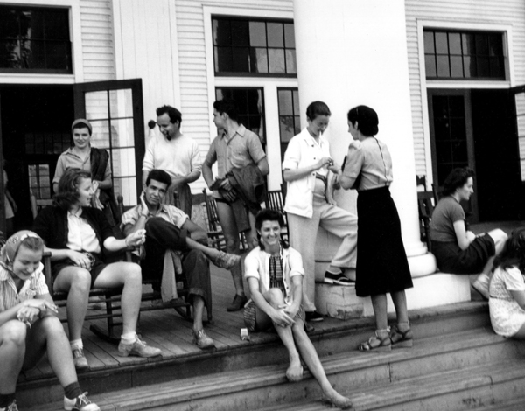 black mountain college
black mountain college
One day down at Black Mountain College, David Tudor was eating his lunch. A student came over to his table and began asking him questions. David Tudor went on eating his lunch. The student kept on asking questions. Finally David Tudor looked at him and said, "If you don't know, why do you ask?"
One spring morning I knocked on Sonya Sekula's door. She lived across the hall. Presently the door was opened just a crack and she said quickly, "I know you're very busy: I won't take a minute of your time."

One of Mies Van der Rohe's pupils, a girl, came to him and said, "I have difficulty studying with you because you don't leave any room for self-expression." He asked her whether she had a pen with her. She did. He said, "Sign your name." She did. He said, "That's what I call self-expression."
One Sunday morning, Mother said to Dad, “Let’s go to church.” Dad said, “O.K.” When they drove up in front, Dad showed no sign of getting out of the car. Mother said, “Aren’t you coming in?” Dad said, “No, I’ll wait for you here.”
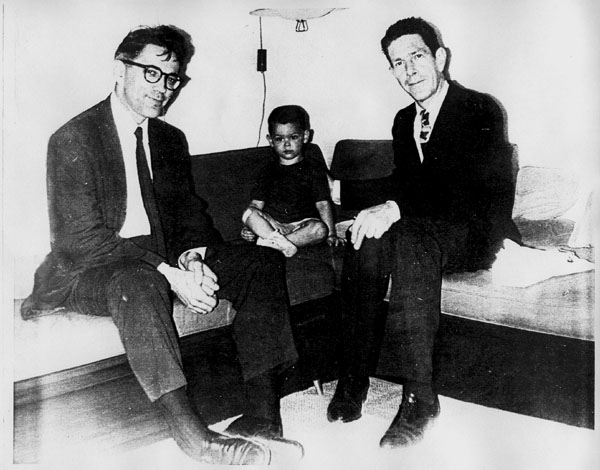
Once I was visiting my Aunt Marge. She was doing her laundry. She turned to me and said, “You know? I love this machine much more than I do your Uncle Walter.”
A young man in Japan arranged his circumstances so that he was able to travel to a distant island to study Zen with a certain Master for a three-year period. At the end of the three years, feeling no sense of accomplishment, he presented himself to the Master and announced his departure. The Master said, “You’ve been here three years. Why don’t you stay three months more?” The student agreed, but at the end of the three months he still felt that he had made no advance. When he told the Master again that he was leaving, the Master said, “Look now, you’ve been here three years and three months. Stay three weeks longer.” The student did, but with no success. When he told the Master that absolutely nothing had happened, the Master said, "You’ve been here three years, three months, and three weeks. Stay three more days, and if, at the end of that time, you have not attained enlightenment, commit suicide.” Towards the end of the second day, the student was enlightened.
When Colin McPhee found out that I was interested in mushrooms, he said, "If you find the morel next spring, call me up, even if you only find one. I'll drop everything, come out, and cook it." Spring came. I found two morels. I called Colin McPhee. He said, “You don’t expect me, do you, to come all that way for two little mushrooms?”
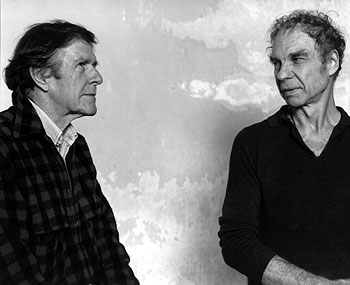 with merce cunninghamWhen I first went to Paris, I did so instead of returning to Pomona College for my junior year. As I looked around, it was Gothic architecture that impressed me the most. And of that architecture I preferred the flamboyant style of the fifteenth century. In this style my interest was attracted by balustrades. These I studied for six weeks in the Bibliothèque Mazarin, getting to the library when the doors were opened and not leaving until they were closed. Professor Pijoan, whom I had known at Pomona, arrived in Paris and asked me what I was doing. (We were standing in one of the railway stations there.) I told him. He gave me literally a swift kick in the pants and then said, “Go tomorrow to Goldfinger. I’ll arrange for you to work with him. He’s a modern architect.” After a month of working with Goldfinger, measuring the dimensions of rooms which he was to modernize, answering the telephone, and drawing Greek columns, I overheard Goldfinger saying, “To be an architect, one must devote one’s life solely to architecture.” I then left him, for, as I explained, there were other things that interested me, music and painting for instance.
with merce cunninghamWhen I first went to Paris, I did so instead of returning to Pomona College for my junior year. As I looked around, it was Gothic architecture that impressed me the most. And of that architecture I preferred the flamboyant style of the fifteenth century. In this style my interest was attracted by balustrades. These I studied for six weeks in the Bibliothèque Mazarin, getting to the library when the doors were opened and not leaving until they were closed. Professor Pijoan, whom I had known at Pomona, arrived in Paris and asked me what I was doing. (We were standing in one of the railway stations there.) I told him. He gave me literally a swift kick in the pants and then said, “Go tomorrow to Goldfinger. I’ll arrange for you to work with him. He’s a modern architect.” After a month of working with Goldfinger, measuring the dimensions of rooms which he was to modernize, answering the telephone, and drawing Greek columns, I overheard Goldfinger saying, “To be an architect, one must devote one’s life solely to architecture.” I then left him, for, as I explained, there were other things that interested me, music and painting for instance.
Five years later, when Schoenberg asked me whether I would devote my life to music, I said, “Of course.” After I had been studying with him for two years, Schoenberg said, “In order to write music, you must have a feeling for harmony.” I explained to him that I had no feeling for harmony. He then said that I would always encounter an obstacle, that it would be as though I came to a wall through which I could not pass. I said, “In that case I will devote my life to beating my head against that wall.”
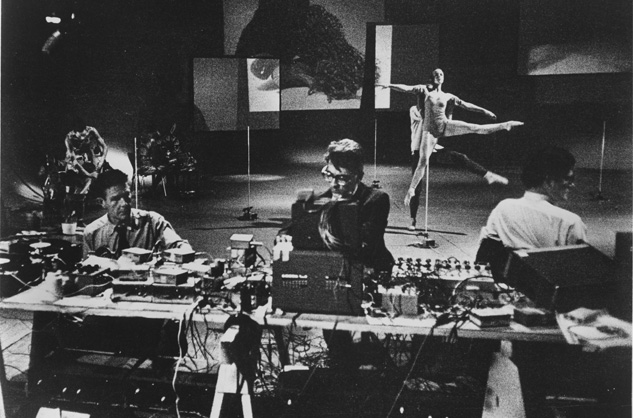 performing variations There was an international conference of philosophers in Hawaii on the subject of Reality. For three days Daisetz Teitaro Suzuki said nothing. Finally the chairman turned to him and asked, “Dr. Suzuki, would you say this table around which we are sitting is real?” Suzuki raised his head and said Yes. The chairman asked in what sense Suzuki thought the table was real. Suzuki said, “In every sense.”
performing variations There was an international conference of philosophers in Hawaii on the subject of Reality. For three days Daisetz Teitaro Suzuki said nothing. Finally the chairman turned to him and asked, “Dr. Suzuki, would you say this table around which we are sitting is real?” Suzuki raised his head and said Yes. The chairman asked in what sense Suzuki thought the table was real. Suzuki said, “In every sense.”
On one occasion, Schoenberg asked a girl in his class to go to the piano and play the first movement of a Beethoven sonata, which was afterwards to be analyzed. She said, "It is too difficult. I can't play it." Schoenberg said, "You're a pianist, aren't you?" She said, "Yes." He said, "Then go to the piano." She did. She had no sooner begun playing than he stopped her to say that she was not playing at the proper tempo. She said that if she played at the proper tempo, she would make mistakes. He said, "Play at the proper tempo and do not make mistakes." She began again, and he stopped her immediately to say that she was making mistakes. She then burst into tears and between sobs explained that she had gone to the dentist earlier that day and that she'd had a tooth pulled out. He said, "Do you have to have a tooth pulled out in order to make mistakes?"
Standing in line, Max Jacob said, gives one the opportunity to practice patience.
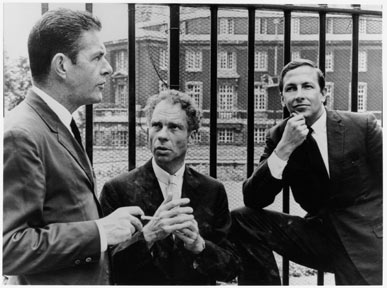 john cage, robert rauschenberg, and merce cunningham Merce Cunningham’s parents were going to Seattle to see their other son, Jack. Mrs. Cunningham was driving. Mr. Cunningham said, “Don’t you think you should go a little slower? You’ll get caught.” He gave this warning several times. Finally, on the outskirts of Seattle they were stopped by a policeman. He asked to see Mrs. Cunningham’s license. She rummaged around in her bag and said, "I just don’t seem to be able to find it." He then asked to see the registration. She looked for it but unsuccessfully. The officer then said, “Well, what are we going to do with you?” Mrs. Cunningham started the engine. Before she drove off, she said, “I just don’t have any more time to waste talking with you. Goodbye.”
john cage, robert rauschenberg, and merce cunningham Merce Cunningham’s parents were going to Seattle to see their other son, Jack. Mrs. Cunningham was driving. Mr. Cunningham said, “Don’t you think you should go a little slower? You’ll get caught.” He gave this warning several times. Finally, on the outskirts of Seattle they were stopped by a policeman. He asked to see Mrs. Cunningham’s license. She rummaged around in her bag and said, "I just don’t seem to be able to find it." He then asked to see the registration. She looked for it but unsuccessfully. The officer then said, “Well, what are we going to do with you?” Mrs. Cunningham started the engine. Before she drove off, she said, “I just don’t have any more time to waste talking with you. Goodbye.”
Morris Graves used to have an old Ford in Seattle. He had removed all the seats and put in a table and chairs so that the car was like a small furnished room with books, a vase with flowers and so forth. One day he drove up to a luncheonette, parked, opened the door on the street side, unrolled a red carpet across the sidewalk. Then he walked down the carpet, went in, and ordered a hamburger. Meanwhile, a crowd gathered, expecting something strange to happen. However, all Graves did was eat the hamburger, pay his bill, get back into the car, roll up the carpet, and drive off.
It was after I got to Boston that I went into the anechoic chamber at Harvard University. Anybody who knows me knows this story. I am constantly telling it. Anyway, in that silent room, I heard two sounds, one high and one low. Afterward I asked the engineer in charge, why if the room was so silent, I had heard two sounds. He said, "Describe them." I did. He said, "The high one was your nervous system in operation. The low one was your blood in circulation."
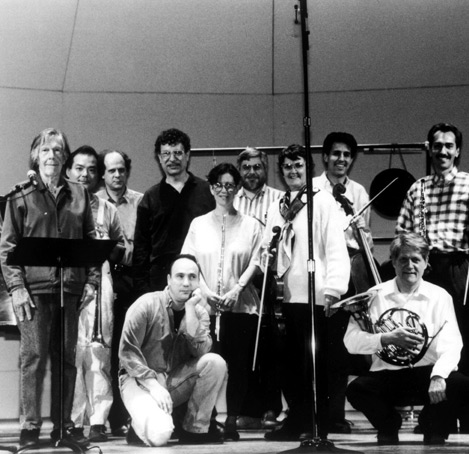
I went to a concert upstairs in Town Hall. The composer whose works were being performed had provided program notes. One of these notes was to the effect that there is too much pain in the world. After the concert I was walking along with the composer and he was telling me how the performances had not been quite up to snuff. So I said, “Well, I enjoyed the music, but I didn’t agree with that program note about there being too much pain in the world.” He said, “What? Don’t you think there’s enough?” I said, “I think there’s just the right amount.”
On Christmas Day, Mother said, "I've listened to your record several times. After hearing all those stories about your childhood, I keep asking myself, "Where was it that I failed?"

A depressed young man came to see Hazel Dreis, the bookbinder. He said, “I’ve decided to commit suicide.” She said, “I think it’s a good idea. Why don’t you do it?”
An Indian woman who lived in the islands was required to come to Juneau to testify in a trial. After she had solemnly sworn to tell the truth, the whole truth, and nothing but the truth, she was asked whether she had been subpoenaed. She said, “Yes. Once on the boat coming over, and once in the hotel here in Juneau.”
 with david tudor Peggy Guggenheim, Santomaso, and I were in a Venetian restaurant.There were only two other people dining in the same room and they were not conversing. I got to expressing my changed views with regard to the French and the Italians. I said that I had years before preferred the French because of their intelligence and had found the Italians playful but intellectually not engaging; that recently, however, I found the French cold in spirit and lacking in freedom of the mind, whereas the Italians seemed warm and surprising. Then it occurred to me that the couple in the room were French. I called across to them and said, “Are you French?” The lady replied. “We are,” she said, “but we agree with you completely.”
with david tudor Peggy Guggenheim, Santomaso, and I were in a Venetian restaurant.There were only two other people dining in the same room and they were not conversing. I got to expressing my changed views with regard to the French and the Italians. I said that I had years before preferred the French because of their intelligence and had found the Italians playful but intellectually not engaging; that recently, however, I found the French cold in spirit and lacking in freedom of the mind, whereas the Italians seemed warm and surprising. Then it occurred to me that the couple in the room were French. I called across to them and said, “Are you French?” The lady replied. “We are,” she said, “but we agree with you completely.”
After a long and arduous journey a young Japanese man arrived deep in a forest where the teacher of his choice was living in a small house he had made. When the student arrived, the teacher was sweeping up fallen leaves. Greeting his master the young man received no greeting in return. And to all his questions, there were no replies. Realizing there was nothing he could do to get the teacher’s attention, the student went to another part of the same forest and built himself a house. Years later, when he was sweeping up fallen leaves, he was enlightened. He then dropped everything, ran through the forest to his teacher, and said, "Thank you."

A woman who lived in the country was asked how cold it had been the previous winter. “Not very cold,” she replied. Then she added, “There were only three or four days when we had to stay in bed all day to keep warm.”
Once when I was in Ann Arbor with Alexander Smith, I said that one of the things I liked about botany was that it was free of the jealousies and selfish feelings that plague the arts, that I would for that reason, if for no other, given my life to live over again, be a botanist rather than a musician. He said, “That shows how little you know about botany.” Later in the conversation I happened to mention the name of a mycologist connected with another midwestern university. Incisively, Smith said, "Don’t mention that man’s name in my house."
 lecturing a class at oberlin One day when I was across the hall visiting Sonya Sekula, I noticed that she was painting left-handed. I said, "Sonya, aren’t you right-handed?" She said, "Yes, but I might lose the use of my right hand, and so I’m practicing using my left." I laughed and said, "What if you lose the use of both hands?" She was busy painting and didn’t bother to reply. Next day when I visited her, she was sitting on the floor, painting with difficulty, for she was holding the brush between two toes of her left foot.
lecturing a class at oberlin One day when I was across the hall visiting Sonya Sekula, I noticed that she was painting left-handed. I said, "Sonya, aren’t you right-handed?" She said, "Yes, but I might lose the use of my right hand, and so I’m practicing using my left." I laughed and said, "What if you lose the use of both hands?" She was busy painting and didn’t bother to reply. Next day when I visited her, she was sitting on the floor, painting with difficulty, for she was holding the brush between two toes of her left foot.
Xenia told me once that when she was a child in Alaska, she and her friends had a club and there was only one rule: No silliness.
John Cage died of a stroke in 1992. You can find the full collection of Cage's Indeterminacy here.
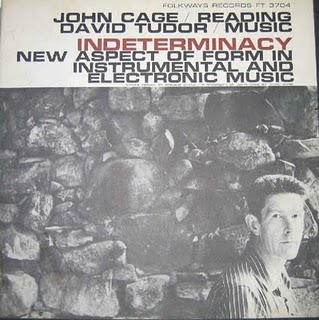
"Every Drop of Rain" - David Bryne & Fatboy Slim (mp3)
"Here Lies Love" - David Byrne & Fatboy Slim (mp3)
"You'll Be Taken Care Of" - David Byrne & Fatboy Slim (mp3)






























